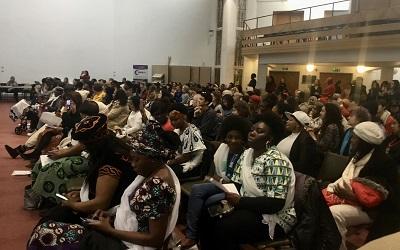Building a better society: Hearing the Sisters not Strangers report

Jeni Williams is Chair of Swansea Women’s Asylum and Refugee Group. In this blog, she shares the chilling findings of a report outlining the experiences of refugee and asylum-seeking women during the pandemic. Jeni is a co-researcher on the COVID-19 Chronicles from the Margins project with OU Professor, Marie Gillespie.
February 2020 was the second time Swansea Women’s Asylum and Refugee Group had attended the Sisters not Strangers National Conference organised by Women for Refugee Women.
This time it was in Birmingham, packed with women asylum seekers, refugees and supporters from a host of organisations, mostly from England, plus ourselves, and Cardiff-based Oasis, from Wales. The conference theme was ‘Sisters not Strangers’ and a coalition of that name was launching a major report investigating the devastating impact of destitution on women refused asylum. Despite the seriousness of the findings it was an exhilarating day of talks, exhibitions, singing, workshops, food and, most important of all, networking because this was the first time that representatives from all 8 of the Sisters not Strangers coalition partners had met each other.
Just five months later and the same coalition has produced a second major report, Hear us: the experiences of refugee and asylum-seeking women during the pandemic. The coalition is deeply aware of the increased vulnerability of already vulnerable women and all members have been supporting women in extreme distress.
The resulting report should shame anyone in power in this country. At a time when social distancing is being stressed, vulnerable women were homeless – or forced to share facilities with non-family members. At a time when Universal credit was raised by £20 to cover the additional costs of the lockdown, asylum seekers’ daily allowance of £5.39 was supplemented by an extra 26p. As public transport was cut back, women could not afford the prices of local shops and went hungry. As charities closed, they lost access to the hot food and hardship payments that had helped them to survive – especially those who were completely destitute. Although the government claimed to offer accommodation, most found it difficult to access. Many, already vulnerable through trauma and ill health, feared being moved away from networks of support into shared accommodation with other traumatised individuals: the tragic incident in Glasgow last month demonstrates how real those fears are. Others reported cockroaches, rats and a lack of hot water – no improvement then on the accommodation offered in Southall last year, or in Manchester the previous year. Existing fears and anxieties were ramped up by insecurity and increased isolation, while digital poverty prevented them from accessing information and finding out about family in their countries of origin.
A summary of the findings reveals:
-
Three quarters of women surveyed went hungry during the pandemic, including mothers who struggled to feed their children.
-
A fifth of women surveyed were homeless, relying on temporary arrangements with acquaintances for shelter, or sleeping outside or on buses.
-
More than 20 of the women surveyed said they did not feel able to go to the NHS even when they or a family member had COVID-19 symptoms.
-
The vast majority (82%) said that their mental health had worsened during the crisis, because of isolation and being cut off from support services.
-
The organisations who produced the report had all supported women trapped in abusive or exploitative situations during the pandemic, including women forced to do unpaid work for shelter and women living with violent partners.
Many women refused asylum are eventually granted it. There are many reasons for an initial refusal; women may lack good legal advice, not understand the legal system, lack key documents that would ‘prove’ persecution (but which would have endangered them in transit); they may be judged through a racist and sexist lens, or discounted because, too ashamed to reveal to strangers what they had endured, they take a long time to disclose it. This demeaning, abusive - and costly - system is why the Hear Us report has extensive recommendations that aim for major changes. The pandemic has revealed the gulf between the haves and have-nots, but it has also revealed that should the have-nots become sick they will endanger everyone else – including those who care only for themselves. In the end it is in all our interests to keep everyone safe and to focus on equality, care and connection as the characteristics of a more humane society in which all can thrive safely.
Request your prospectus
![]()
Explore our qualifications and courses by requesting one of our prospectuses today.